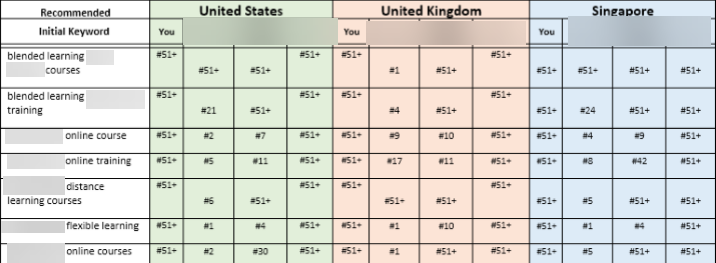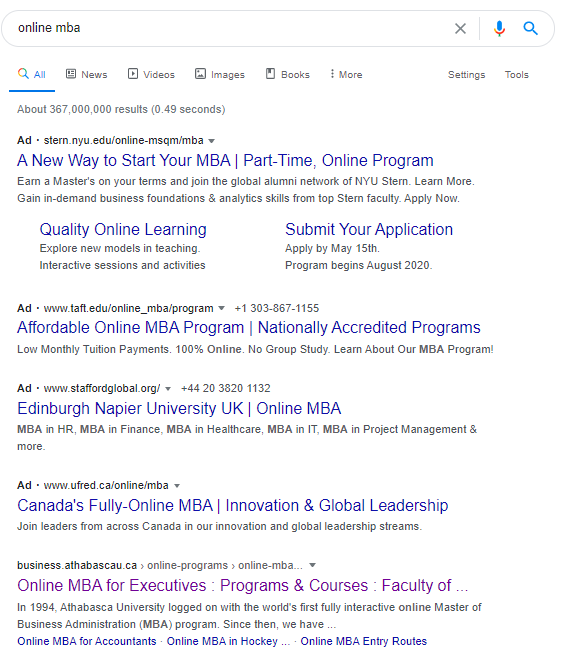With the COVID-19 crisis creating uncertainty as to when and how physical campuses will be able to reopen, many schools have turned to online learning as a potential solution. By either transitioning classroom-based courses online or focusing their efforts on their existing online programs, schools can offer students a learning option they can be sure will be viable regardless of what the coming months will bring. The next step is to take advantage of the benefits of SEO for online education to promote your new offerings.
The trouble is that when it comes to promoting your courses and driving website traffic, it isn’t always that simple. Even before the pandemic, online learning was already big business, and schools and other specialized providers invested a lot of time and resources into building up their visibility in searches related to this area.
In simple terms, that means that when a would-be student types ‘online courses’ or something similar into Google, they are more likely to be shown the website of one of these schools than yours.
So what can you do about it? Here are some SEO tips to follow as we enumerate the benefits of SEO for online education.

Maximizing the Benefits of SEO for Online Education with Keyword Research
Creating an SEO strategy to attract prospects for your online programs begins the same way you would begin any other SEO strategy – with keyword research.
Using tools like Moz, Google Ads Keyword Planner, and Search Console, you can define a list of keywords to target in your content and on your web pages. The only major difference is that these keywords need to pertain specifically to online learning. For the most part, these terms will be similar to keywords you are already targeting, just with words like online, remote or distance included.
Example: The Google Ads Keywords Planner will show you the average monthly searches of specific keywords, as well as suggestions for similar searches you can target.

Since you may be able to attract students from anywhere in the world to these programs, localized variations of your keywords will probably be less important. However, you may still need to include them if the courses you are promoting relate to fields that have specific local regulations or qualifications.
For instance, many qualifications in the legal field need to adhere to the standards of the legal system in their particular jurisdiction because the sector is heavily regionalized. A college in Toronto, therefore, may find that the keyword become a paralegal in Ontario is more valuable than the keyword become a paralegal in attracting viable leads for its program.
Benchmarking Your Current Visibility in Searches for Online Learning
Once you have identified the keywords you want to target, you should evaluate where your website currently ranks in these searches. Keyword tracking platforms like Moz can be useful for this purpose, and will allow you to chart your ranking in specific regions, too. You should also take the time to benchmark your rankings against your competitors in order to evaluate whether you currently have an advantage or disadvantage in this area.
Example: An excerpt from a Competitive Ranking Analysis that Higher Education Marketing completed for an online course provider.

If you have only just begun offering courses online, it’s probably quite likely that you will be disappointed with your results. After all, schools that specialize in these courses have likely been focusing on and building authority for the keywords you are targeting for many years.
Example: The highest-ranking schools in a Quebec-based search for the term MBA degree are Ryerson University’s Ted Rogers School of Management and The University of Toronto’s Rotman School of Management, two of Canada’s most reputable business schools.

A search for the term MBA online, however, yields very different results. Athabasca University and University Canada West, two schools that focus heavily on offering online courses, take the highest spots.

In contrast, Ryerson and Rotman don’t show up until pages three and six, respectively.
Even if your school has been offering online programs for years, you could still find yourself having trouble ranking in searches like these. If they have traditionally only been a small part of your course mix and overall enrollment numbers, you likely won’t have dedicated the same time and effort to promoting them as schools who rely heavily on these courses.
While this can be a sobering exercise, don’t lose hope. There are still many ways in which you can build authority in this area, and gradually gain a level of visibility for your online offerings that rivals your classroom courses. HEM now offers Express Audits of SEO for education websites specifically in this area, to give schools a quick evaluation of their visibility and provide recommendations for improvement.
Reviewing Your School’s Technical & On-Page SEO
Once you have the keywords you need to target, you can start the job of integrating them across your website. Draw up a list of any pages that pertain to your online courses, and try to incorporate these keywords into your page titles, header tags and meta descriptions.
Returning to the example in the previous section, Athabasca University has done this particularly well. On the search page, you can see that the meta description uses variants of the keyword a couple of times:

While this is not generally believed to directly affect rankings, it still assures users that the page matches what they are looking for, which can result in higher clicks.
On the page itself, you can also see that the page title has been optimized for SEO:

Not only that, but the H1 contains the same keyword:

Now might also be a good time to review your SEO from a technical standpoint, and make sure it is in good shape. Some elements you may want to look at would include:
- Your overall website architecture and sitemap
- Identifying any broken links
- Your page load speed
- Page name (URL) optimization
While these factors do not specifically pertain to SEO for online education, it’s always a good idea to make sure your overall SEO is in good health when you are attempting to rejig your strategy. This way, you can take better advantage of the benefits of SEO for online education. Besides, you don’t want to invest a lot of time and energy into trying to target online education keywords only to fall down because of overlooked technical issues and errors.
Presenting Online Education on Your Program Pages
People often make the mistake of assuming that SEO is merely about having the right words in the right place and ignoring what the larger goal of search algorithms is – namely, to help people find what they are looking for.
Search engines pay attention to what people are clicking on, how long they stay on a website and whether they return to it in order to determine how well a web page matches user intent. That means that improving the overall user experience of the web pages which promote your online programs could pay dividends – allowing you to make the most of the benefits of SEO for online education.
In addition to evaluating your on-page and technical SEO, you should also spend some time ensuring that your website presents your online learning offerings in a way that will appeal to prospects.
This is particularly important if you are new to the format. If your program pages simply present your online courses the same way you would present your in-class programs, you may not be answering some of the key questions prospective online students will have.
For instance, they may want to know more about the learning management system (LMS) your school uses and how it works, or be looking for details about how flexible your course is, or simply want reassurance that their qualification will be equal to that of graduates on your campus.
Adding these details will make your page richer and provide a better user experience for visitors, which in turn could help your SEO. If you’re not sure where to start, look at schools that have been offering similar courses to yours online for a long time, and how they present them.
Example: At many universities, the continuing studies departments are showing others the way forward when it comes to online learning, as they have been delivering courses in this format for many years.
The program pages of York University’s School of Continuing Studies includes a detailed description of how their learning format works, which answers many typical concerns and questions of prospective students.

It might even be a good idea to create separate pages for the online versions of your courses. This will allow you to go into more depth, with the added bonus of adding more indexable pages to your website to help build your domain authority.
Creating Content to Gain the Benefits of SEO for Online Education
Of course, one of the most surefire ways to boost your SEO for any targeted search is to produce more content. By developing SEO-driven blogs and articles which incorporate specific keywords, you can improve your chances of ranking for them.
This approach has the added bonus of allowing you to address specific concerns and questions your audience may have about online learning, particularly if it is a new endeavour for your school.
Fortunately, there are plenty of creative blog topic ideas around this subject that you could put your own spin on. For instance, you could create a blog about studying or planning a schedule for online courses, offering tips for how to stay motivated, track progress, and communicate with classmates and instructors remotely.
When considering online learning for the first time, many students are apprehensive about how the process works in practice. By blogging about it, you will be showing them a way forward which may be just the final push they need to apply.
Example: California State University Monterey Bay created this blog for candidates considering an online MBA.

You could also develop content around completing assignments online, approaching groupwork, or balancing online learning alongside work or personal commitments. What’s more, you can illustrate the benefits of the format, highlighting its flexibility, the options it opens up to study anywhere in the world, or even the additional learning and study support facilitated by your school’s LMS.
Supplementing Your SEO Efforts With Paid Advertising for Online Courses
The downside of focusing on SEO for online learning is that it can take time to see results. Most experts estimate that the average time it takes for a new blog or web page to gain traction and start ranking in search results is somewhere between 3 and 6 months.
While starting now can help you make some headway, it may be worth considering supplementing your SEO efforts with paid advertising campaigns if you’re looking to attract students for your online programs over the next few months.
Paid ads have the advantage of allowing you to achieve instant visibility for your online courses and drive more traffic in the short-term. You can also target prospects from further afield by running campaigns in different countries and regions, which can be valuable as organic search tends to heavily favour more localized results.
Example: While a Quebec-based search for an online MBA mostly displays Canadian schools in its organic results, the ads on this page include schools in the UK and USA.

Although it shouldn’t be overstated, paid ad campaigns may have some fringe benefits for your organic efforts over time, too. Prospects who find your school through ads may be more likely to click on your pages through organic listings at a later point, which will boost your rankings.
While investing in paid advertising may not sound appealing at a time when many schools budgets are stretched, it’s important to consider that focusing on organic SEO requires a lot of time and energy from your staff as well, which isn’t free. Depending on your circumstances, paid campaigns may prove to be the cheaper option.
However, this doesn’t mean that investing in SEO to promote your online courses isn’t as worthwhile. It’s likely that this is only the beginning of a boom in demand for online study options. Even after the lockdown ends, many students and parents will be apprehensive about a second wave or another similar crisis occurring in the future. Choosing an online course over an on-campus option will give them the security of knowing they can reach their educational goals regardless of what the future holds.
As a result, schools looking to give themselves the best chance of reaching their enrollment targets over the next few years would do well to establish visibility for their online courses on the web. Putting in the hard yards to build your SEO authority in this area can help you maximize the benefits of SEO for online education, ensuring that your school can attract a steady stream of inquiries and applications in the long term.







